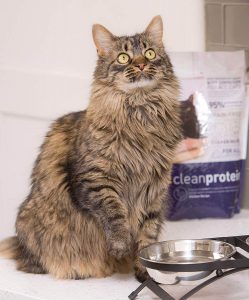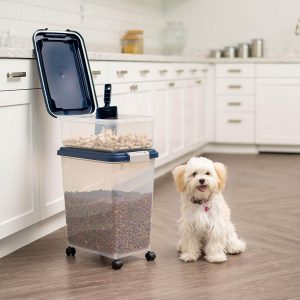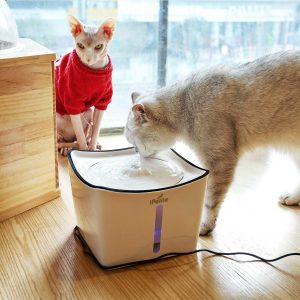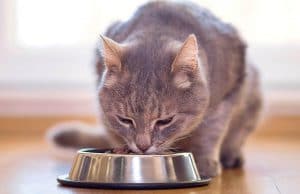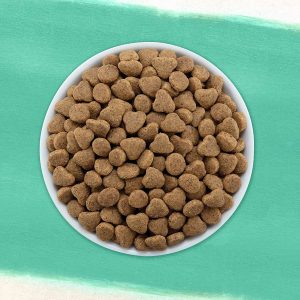- Written by: Sarah
- Last Update:
The 5 Best Cat Foods for Sensitive Stomachs
Not all of our cats are capable of just wolfing down whatever we throw at them. For those kitties with a delicate gastrointestinal tract, it can be hard to make sure that you’ve got the right food. Luckily for you, we’ve done the research to bring you only the best cat food for sensitive stomachs. Let’s dive right in, and we’ll help you decide which is the best for you and your feline.
| Editor's Picks | Brand | Rating |
|---|---|---|
| Best Wet Food for Sensitive Stomachs | Royal Canin Feline Digest Sensitive | 4.9 |
| Runner Up Wet Food | Purina Pro Plan Sensitive Stomach | 4.7 |
| Best Dry Food for Sensitive Stomachs | Hill's Science Diet Dry Cat Food | 4.6 |
| Runner Up Dry Food | Purina ONE Sensitive Systems | 4.4 |
| Budget Option | Blue Buffalo Sensitive Stomach | 4.1 |
Our Top Pick
Royal Canin Feline Digest Sensitive
With a special formula including easily digestible protein and a wide range of vitamins and minerals, Royal Canin delivers for cats with easily upset stomachs. As an added bonus, it seems to reduce stool odor, making the litter box a bit less of an olfactory hazard. It might also be the best cat food for older cats with sensitive stomachs around!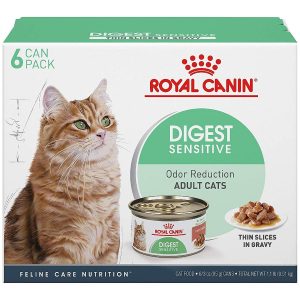
Table of Contents
Top Cat Food for Sensitive Stomachs
Best Wet Food for Sensitive Stomachs
Royal Canin Feline Digest Sensitive

Royal Canin also claims that it reduces the odor of feline poop. It’s a nice added bonus, especially as your cat begins to adjust to their new diet. And they will adjust, most cats take readily to the flavor.
You can also find a dry food accompaniment that is specifically meant to allow for the most GI tract relief possible. It’s an added bonus to the overall healthiness and easy digestibility of the food that some pet owners are willing to take advantage of.
The problem? It’s expensive for wet food. It also has a rather strong odor, so think carefully about where you feed your cat if your stomach turns at the smell of wet cat food.
Our Opinion:
While rather expensive, Royal Canin’s Feline Digest Sensitive is a front line defense against an irritated stomach that might just be a major lifesaver for cats with vomiting problems. Give it a shot before you try anything else.
Runner Up Wet Food
Purina Pro Plan Sensitive Stomach
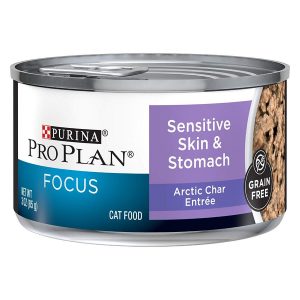
It’s not quite as well balanced, but it’s still highly digestible and grain-free. The lower cost is also a big bonus for those who are a bit short, but if you’re really strapped, then we recommend looking at our budget option first.
The one we recommend is fish-flavored, which is generally well accepted by the vast majority of felines. Snatch it up if your cat loves fish already, and you’ll be on the right track.
The problems with it aren’t big. It’s from Purina, so it has a bit more of a “standard” nutrient profile, and not all cats readily take to it.
Our Opinion:
Still, for those who are looking for another option for wet food for sensitive stomachs, Pro Plan Sensitive Stomach is a good option to look into. Give it a shot, and you won't be disappointed.
Best Dry Food for Sensitive Stomachs
Hill’s Science Diet Dry Cat Food
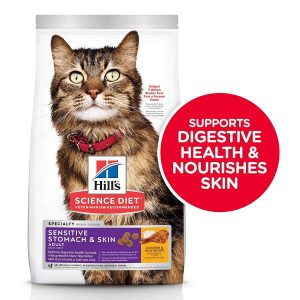
In addition to being easily digestible and having a flavor that cats love, this food also has probiotics included. Probiotics will help to populate your cat’s gastrointestinal tract with better microfauna and help reduce the sensitivity of your cat’s stomach over time.
Essentially, it’s a kibble that also promotes overall gut health. That’s a double whammy. There are also vitamins included, helping with your cat’s skin health as well and making this absolutely the best kibble for sensitive stomachs around.
It’s also very expensive compared to most dry cat foods, and not all varieties are grain-free. We recommend avoiding the chicken and rice flavor, for instance.
Our Opinion:
On the other hand, this vet-recommended, excellently formulated dry food is awesome for handling stomach problems. If you can sink the money into your cat's health, we recommend it as the best cat food for digestive problems.
Runner Up Dry Food
Purina ONE Sensitive Systems
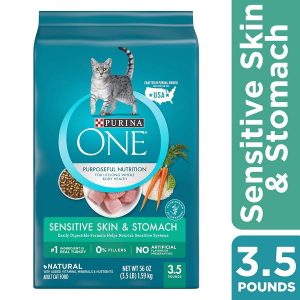
It’s also higher in protein than the majority of sensitive stomach foods, so it’s a great option if your cat has gotten scrawny from losing their food. Add in some skin-nourishing vitamin E, and you’ve got a pretty good product overall.
Many pet owners feed Purina anyways, and many of the same flavorings are used here, so it’ll be an easier switch. Overall that makes it a great option for cats who’ve suddenly developed a sensitive stomach.
That said, it’s not the best balanced, and it’s not going to be able to compete with a kibble that actually has probiotics.
Our Opinion:
Still, the price is right, and it's a great first-line try due to that alone. Give it a shot for treating a sensitive cat, and you may have found a bargain bin winner.
Budget Option
Blue Buffalo Sensitive Stomach
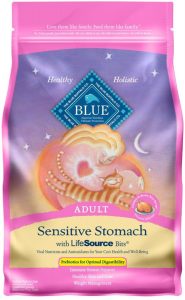
It’s designed not just for sensitive stomachs but also to help with skin and overall health through a blend of omega fatty acids and vitamins. Blue Buffalo’s whole gig is healthy cat food, and they consistently deliver.
It’s even got probiotics to help with overall gut health in the long run. If that’s not a win, we don’t know what is.
The downside? It’s not always going to be the best option, and there aren’t any other flavors available. It’s also got rice, which can cause allergies in some sensitive felines.
Our Opinion:
Still, if you're looking for great, cheaper food for getting your cat's GI tract back in good health, give it a shot. It's balanced well, and Blue Buffalo's reputation is absolutely sterling.
When Should You Make the Switch?

Chances are you know if your cat has a sensitive stomach in the first place. Vomiting, diarrhea, and ridiculously smelly flatulence are all common signs.
Some owners are kind of stuck in the dark, especially if it’s their first cat. The truth is that the source of these problems is often the food and the allergies which come along with it.
Using cheap dry food is often the culprit. In an effort to cut costs, many manufacturers use grains and animal byproducts as filler rather than making a real effort to meet the hypercarnivore needs that cats have.

Not all cases of gastrointestinal upset are the cause of food. However, your cat may also be suffering from one of the following:
- General stomach illness
- Eating too quickly on an empty stomach
- Ingestion of toxic substances
- More serious conditions
As a general rule, however, if Fluffy has been vomiting on a regular basis and isn’t suffering from any other ill effects, then you’re probably looking at a cat that needs a food designed for sensitive stomachs.
In any case, persistent GI upsets in your cat should be taken to the vet before you make a final decision.
What Kind of Food is Right for Sensitive Stomachs?
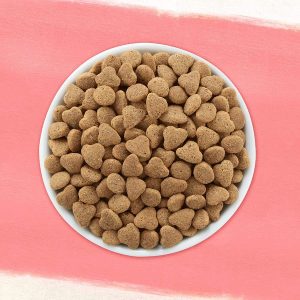
They’re usually available in both wet and dry varieties, but in this case, it turns out that wet food is often the way to go. If you’re still having trouble after switching to a specially designed wet food, then a combination of wet and dry food can help ensure that the animal’s stomach isn’t upset.
There’s one other factor that people sometimes aren’t aware of: try to find a food with a single protein source. It’s especially a good idea if you’re able to get roughly the same food with different flavors.
Some cats may have allergies to specific proteins. As a general rule, once you’ve switched to a grain-free formula with few ingredients, you may need to switch flavors if the problems persist, and the veterinarian has given your cat a clean bill of health.

Essentially, you’re looking for the following:
- Minimal ingredients
- Real protein
- Different protein sources available
- No grains
As long as those requirements are fulfilled, you’re probably looking at food which is suitable for avoiding an upset tummy.
Remember to check with a vet first: gastrointestinal problems can point to some serious conditions, particularly if they’re persistent.
How to Switch Your Sensitive Cat to a New Food

The usual method of switching still applies here: add in new foods slowly with the old. The issue is that you may need to take longer to switch over as your cat’s gut adjusts to their new diet.
Do the following, and you’ll come out just fine:
- Add ¼ of the new food as the initial portion. Wait two to three days before adding more.
- Up the portion to ½ and allow a few more days for your cat to adjust.
- Bring the total of new food up to ¾ and wait four to five days.
- Switch the food over entirely.
It’ll take a little bit more time than when you normally switch out your cat’s diet, but in the end, the results should be well worth it.
What Else Can I Do For My Cat’s Sensitive Gut?

We recommend trying the following:
- Mix up dry and wet foods in equal proportions. This can often help your cat more than you might think, even if it is a bit more labor-intensive.
- You can also use probiotic supplements if the food you’ve chosen doesn’t already have them included.
- Some cats will eat too quickly; in that case, a slow feeding bowl may be a good option.
- Make sure your cat is able to eat in a quiet place.
- Check with a vet if problems persist no matter what you feed your feline.

For the most part, those cats which are just having GI problems won’t require much more than fine-tuning their diet over time. If the first attempt at a food change doesn’t work, then don’t give up just yet. It can take quite a few tries to make sure that you’ve got the right food.
Cat Food for Sensitive Stomach FAQ
What makes a cat food good for sensitive stomachs?

What proteins are best for cats with sensitive stomachs?
We recommend going with fish flavors as a first-line. Very few cats have problems accepting fish proteins. Most cats don’t have a direct protein allergy, but the most common are poultry, particularly with meat from chickens.
How should I mix wet and dry foods for my cat’s sensitive stomach?

What other conditions can cause a sensitive stomach in my cat?
Everything from IBS to cancer can cause chronic stomach upsets, and it’s usually one of the best indicators that a cat is ill in the first place. Go to a vet at the first opportunity, your cat’s life may depend on it. Most of the time, it’s just a small problem, but it’s not worth the risk of missing a serious illness.


